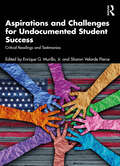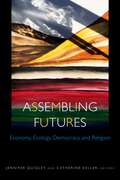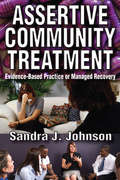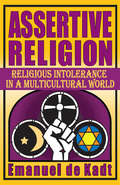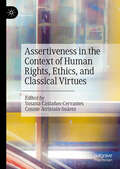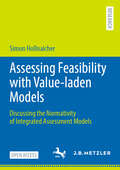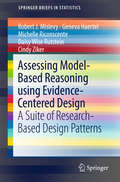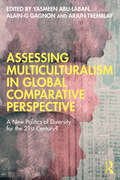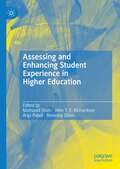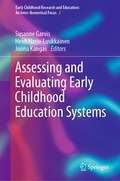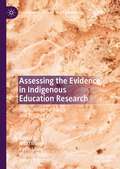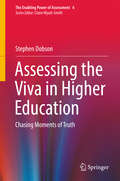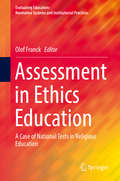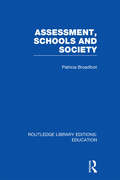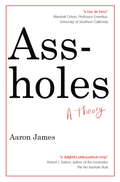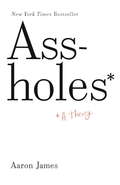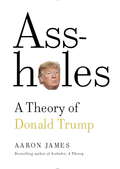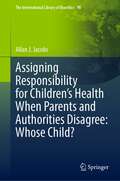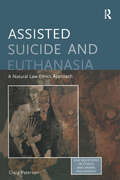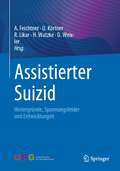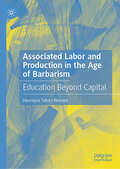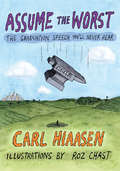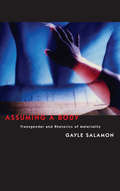- Table View
- List View
Aspirations and Challenges for Undocumented Student Success: Critical Readings and Testimonios
by Enrique G. Murillo Sharon Velarde PierceAspirations and Challenges for Undocumented Student Success offers a comprehensive review of rigorous, innovative, and critical scholarship profiling the scope and terrain on undocumented student success. Compiling the most significant work in the field in terms of its contributions to research and professional practice, the volume opens with an exploration the aspirations of undocumented students and the fight for equity, followed by an examination of the impact and influence of parents and families on educational outcomes. Finally, it concludes with testimonios reflecting on the educational experiences of undocumented students in America. Each section presents readings in chronological order, demonstrating the progression around undocumented student success in the field over the past 20+ years, in respect to the intentionality about integrating undocumented student success throughout equity initiatives, breaking down institutional silos, fostering welcoming campus environments, and advocating for solutions that allow undocumented students to achieve economic mobility in both policy and practice. This text is a must-have resource for graduate students and researchers in Educational Leadership and Policy, Multicultural Education, and Teacher Education. It will also be important reading for educational leaders, teachers, counselors, administrators, and organizations that share a common interest in and commitment to the educational issues that impact undocumented students and their families.
Assembling Futures: Economy, Ecology, Democracy, and Religion (Transdisciplinary Theological Colloquia)
by Jennifer Quigley and Catherine KellerTransdisciplinary insights at the intersection of religion, democracy, ecology, and economyWhat is the relationship of religion to economy, ecology, and democracy? In our fraught moment, what critical questions of religion may help to assembly democratic processes, ecosystems, and economic structures differently? What possible futures might emerge from transdisciplinary work across these traditionally siloed scholarly areas of interest?The essays in Assembling Futures reflect scholarly conversations among historians, political scientists, theologians, biblical studies scholars, and scholars of religion that transgress disciplinary boundaries to consider urgent matters expressive of the values, practices, and questions that shape human existence. Each essay recognizes urgent imbrications of the global economy, multinational politics, and the materiality of ecological entanglements in assembling still possible futures for the earth. Precisely in their diversity of disciplinary starting points and ethical styles, the essays that follow enact their intersectional forcefield even more vibrantly.
Assertive Community Treatment: Evidence-based Practice or Managed Recovery
by Sandra JohnsonThe twenty-first century has witnessed an explosion in studies on comparative health studies, but mental health remains virtually ignored. Unlike the well researched topic of health policy, there is a gap in the marketplace covering mental health policy and health care policymaking. This book fills that gap; it is a comparative analysis of the implementation of Assertive Community Treatment (ACT), an evidence-based practice employed in two states that promises to empower the well-being of individuals suffering from mental illness.Assertive Community Treatment specifically examines the tension separating the notion of client recovery and evidence-based programs. Johnson challenges the assumption that practitioners should rely on evidence-based practices to close the gap between scientific knowledge and practice. She argues that in an era of managed care, this encourages state mental health administrators to adopt policies that are overly focused on outcomes. Programs that can measure the outcomes of care provided, and evidence-based practices, have become central aspects of the quality care agenda.This study traces the role of policy entrepreneurs throughout the Assertive Community Treatment policymaking process. By differentiating mental health in general, qualitative research increases the chances of observing similarities and differences in outcomes. Johnson explains why the ACT model was adopted and implemented. She concludes that there is a clear monopoly by medical researchers and scientists within Assertive Community Treatment research, and as a result, too much emphasis is placed on the roles of policy entrepreneurs as the main innovators in the agenda and policy formulation stages. Johnson presents a strong argument for more innovation in the implementation stage.
Assertive Religion: Religious Intolerance in a Multicultural World
by Emanuel de KadtQuestions about religions and religious institutions have changed dramatically since they first arose many years ago. In the beginning of the twenty-first century, the link of religion with extreme ideologies captures our attention. Such questions have been the focus of a steadily growing number of books. What does Assertive Religion add to the debate?Emanuel de Kadt discusses the relationship of religion to wider social issues such as human rights and multiculturalism. He traces the growth, during the religious revival over the past decades, of assertive, and even coercive, forms of religion, notably—but not exclusively—fundamentalist varieties. He deals with these questions as they relate to the three major Abrahamic religions, thereby addressing a readership wider than that made up of persons interested exclusively in Judaism, Christianity, or Islam.The author takes on issues such as the effects of the "Jewishness" of Israel on the rights of Palestinians; the consequences of the centralized authority structure of the Roman Catholic Church; and the implications of the failure of reform-oriented Muslims to make their voices heard in an organized Islamic reform movement. He is even-handed, focusing on both positive and negative features of each religious perspective, though he does have a clear viewpoint. Assertive Religion adds to increasingly sharp political discussions on issues arising out of religion. It is a must read for anyone interested in how religion is shaping the world of tomorrow.
Assertiveness in the Context of Human Rights, Ethics, and Classical Virtues
by Connie Atristain-Suárez Susana Castaños-CervantesWhether in everyday disagreements, bargaining episodes, or high-stakes disputes, people typically see a spectrum of possible responses to dealing with differences with others, ranging from avoidance and accommodation to competition and aggression. When coming across such circumstances, it is crucial to advocate for oneself –our positions, to achieve personal goals, overcome difficulties, and be determined- but control aggressive impulses without harming the rights and interests of others. This book addresses assertiveness from a human rights perspective, using a mixed methods approach. It explores how assertiveness as a human right promotes human dignity and helps build more just, equitable, peaceful, and inclusive societies. With interdisciplinary contributors working in diverse fields, the collection brings together theoretical and applied research evidence on assertive rights. The collection examines assertive rights as critical factors for developing assertive behavior and as a virtue for personal development, empowerment, and thriving.
Assessing Feasibility with Value-laden Models: Discussing the Normativity of Integrated Assessment Models
by Simon HollnaicherIn this Open-Access-book, the author investigates the value dimension of Integrated Assessment Models and their application to questions of feasibility. Integrated models provide a quantified representation of the interaction between the socio-economic system with the climate and serve as a pivotal tool at the intersection of climate science, policymakers, and society. This book critically examines how IAMs approach the concept of feasibility. It unpacks the value assumptions embedded within integrated modeling, critiques the implicit normativity of these models, and proposes principles for responsibly managing value judgments in scientific advice. Arguing for a thick conception of feasibility—one that integrates key normative dimensions—it highlights the gap between conceptual discussions of feasibility and the scientific practices that inform feasibility assessments. Addressed to both philosophers and integrated modelers, this book sheds light on the implicit values shaping our collective visions for the future.
Assessing Model-Based Reasoning using Evidence- Centered Design: A Suite of Research-Based Design Patterns (SpringerBriefs in Statistics)
by Robert J Mislevy Geneva Haertel Michelle Riconscente Daisy Wise Rutstein Cindy ZikerThis Springer Brief provides theory, practical guidance, and support tools to help designers create complex, valid assessment tasks for hard-to-measure, yet crucial, science education standards. Understanding, exploring, and interacting with the world through models characterizes science in all its branches and at all levels of education. Model-based reasoning is central to science education and thus science assessment. Current interest in developing and using models has increased with the release of the Next Generation Science Standards, which identified this as one of the eight practices of science and engineering. However, the interactive, complex, and often technology-based tasks that are needed to assess model-based reasoning in its fullest forms are difficult to develop. Building on research in assessment, science education, and learning science, this Brief describes a suite of design patterns that can help assessment designers, researchers, and teachers create tasks for assessing aspects of model-based reasoning: Model Formation, Model Use, Model Elaboration, Model Articulation, Model Evaluation, Model Revision, and Model-Based Inquiry. Each design pattern lays out considerations concerning targeted knowledge and ways of capturing and evaluating students' work. These design patterns are available at http://design-drk. padi. sri. com/padi/do/NodeAction'state=listNodes&NODE_TYPE=PARADIGM_TYPE. The ideas are illustrated with examples from existing assessments and the research literature.
Assessing Multiculturalism in Global Comparative Perspective: A New Politics of Diversity for the 21st Century?
by Yasmeen Abu-Laban, Alain-G Gagnon and Arjun TremblayIn Assessing Multiculturalism in Global Comparative Perspective, a group of leading scholars come together in a multidisciplinary collection to assess multiculturalism through an international comparative perspective. Multiculturalism today faces challenges like never before, through the concurrent rise of populism and white supremacist groups, and contemporary social movements mobilizing around alternative ideas of decolonization, anti-racism and national self-determination Taking these challenges head on, and with the backdrop that the term multiculturalism originated in Canada before going global, this collection of chapters presents a global comparative view of multiculturalism, through both empirical and normative perspectives, with the overarching aim of comprehending multiculturalism’s promise, limitations, contemporary challenges, trajectory and possible futures. Collectively, the chapters provide the basis for a critical assessment of multiculturalism’s first 50 years, as well as vital insight into whether multiculturalism is best equipped to meet the distinct challenges characterizing this juncture of the 21st century. With coverage including the Americas, Europe, Oceania, Africa and Asia, and thematic coverage of citizenship, religion, security, gender, Black Lives Matter and the post-pandemic order, Assessing Multiculturalism in Global Comparative Perspective presents a comprehensively global collection that is indispensable reading for scholars and students of diversity in the 21st century.
Assessing and Enhancing Student Experience in Higher Education
by John T. E. Richardson Anja Pabel Mahsood Shah Beverley OliverThe book makes an important contribution to the discourse on student experience in higher education. The book includes chapters that cover important aspects of the 21st century student experience. Chapters cover issues such as: new trends and insights on the student experience; the changing profile of students in higher education and performance measures used to assess the quality of student experience, institutional approaches in engaging students, using student voice to improve the quality of teaching, COVID-19 and its impact on international students, innovative partnerships between students and academic staff, student feedback and raising academic standards, the increased use of qualitative data in gaining insights into student experience, the use of innovative learning spaces and technology to enhance the learning experience, and the potentially disrupting nature of student feedback and its impact on the health and wellbeing of academic staff, and the increased use of social media reviews by students.
Assessing and Evaluating Early Childhood Education Systems (Early Childhood Research and Education: An Inter-theoretical Focus #2)
by Susanne Garvis Heidi Harju-Luukkainen Jonna KangasThis book provides global perspectives on assessment and evaluation practices with young children in contemporary times within early childhood education systems. It critiques and evaluates current evaluation and assessment goals and tools in early childhood settings. The book also compares the different approaches to educational evaluations from different countries in early childhood education and care. It provides insights into different approaches, techniques as well as perspectives of micro and macro-levels of analysis. This book aims to create an international understanding about the thematic conceptions of assessment for early childhood education and care.
Assessing the Evidence in Indigenous Education Research: Implications for Policy and Practice (Postcolonial Studies in Education)
by Kevin Lowe Karen Trimmer Roselyn Dixon Nikki MoodieThis book explores the current state of research on Indigenous education Australia. In particular, these chapters focus on exploring deep and enduring questions about the failures of schooling to address the needs of Aboriginal communities. This book provides a systematic analysis of existing research to explain how connection to culture - and the recognition of Indigenous sovereignties and knowledges - are the keys to Aboriginal excellence in schooling.
Assessing the Viva in Higher Education: Chasing Moments of Truth (The Enabling Power of Assessment #6)
by Stephen DobsonThis book makes the case for a revival in interest in the viva. As an oral assessment of a treatise or dissertation or of a student's performance in art or dance the viva has a long history dating back to the time of the Greeks. It can be found today in the form of professional, vocational and academic vivas, where a judgment of oral performance is required to gain entry into a profession or community of scholars. In a time when there are scandals about students selling essays to other students, the viva provides a fertile ground for probing the student to see whether they are in fact the authors of the work being assessed and know its content and how to think cognitively or otherwise. Given that we actually know so little about the viva, the book theorises the viva based on a unique sample of vivas that have been filmed or in which the author himself has been participant, and discusses why its format is so different in Anglo-Saxon languages and Latin and other languages. The book offers educational policy-makers and examiners a trade-off between arguments in support of the viva and the demand for other, ever more cost-effective forms of assessment as the numbers of both undergraduate and postgraduate students threaten to increase. It also argues that with demand in the labour market for qualified graduates who are better equipped with transferable skills, such as the ability to communicate complex ideas verbally in a competent, well-argued fashion and not merely through the use of rhetoric, what appear to be cost-effective forms of assessment in the short run (e. g. written exams with standardised questions or multiple choice) may actually in the long run be of less value if we are investing in a future workforce with so-called 21st century communication skills. If the viva were abandoned, the student would be robbed of the opportunity to stage a defence.
Assessment in Ethics Education: A Case of National Tests in Religious Education (Evaluating Education: Normative Systems and Institutional Practices)
by Olof FranckThis book presents a number of fundamentally challenging perspectives that have been brought to the fore by the national tests on religious education (RE) in Sweden. It particularly focuses on the content under the heading Ethics. It is common knowledge that many teachers find these parts difficult to handle within RE. Further, ethics is a field that addresses a range of moral and existential issues that are not easily treated. Many of these issues may be said to belong to the philosophical context, in which "eternal questions" are gathered and reflected upon. The first chapters highlight the concepts of ethical competence and critical thinking. In the following chapters the concept of ethical competence is analyzed with regard to teachers' objectives and to students' texts, respectively. These chapters pursue a more practice-related approach and highlight specific challenges identified from both teacher and student perspectives. Next, the book raises the issue of global responsibility. What kind of critical issues arise when handling such matters at school? Further, can contemporary moral philosophers contribute to such a discussion? In turn, the book discusses the role of statistical analyses with regard to national tests, while the closing chapters present international perspectives on the book's main themes and concluding remarks. The book's critical yet constructive approach to issues regarding assessment in ethics education makes a valuable contribution to an ongoing debate among researchers as well as to the everyday communication on testing in schools and classrooms. As such, it will appeal to scholars in ethics education and researchers in the field of assessment, as well as educators and teachers interested and engaged in the task of testing ethics in school contexts where curricular demands for valid and authoritative evaluation may provide important guidelines, but may also pose challenges of their own.
Assessment of Practices in Early Elementary Classrooms (APEEC)
by Mary L. Hemmeter Kelly L. Maxwell Melinda J. Ault John W. Schuster Mary Hemmeter Kelly Maxwell Robert V. BulloughAPEEC is the first measurement scale designed to evaluate the use of developmentally appropriate practices in the early elementary classroom (K 3). Developed for classrooms serving both children with and without disabilities, the APEEC can be used by administrators and researchers to evaluate the degree of developmental appropriateness in inclusive and general education classrooms. It can also be used by teachers as a self-assessment tool. The book includes a carefully thought-out score sheet, which can be photocopied for use in rating classrooms. Featuring straightforward language and an easy-to-follow format, APEEC is organized under three main categories: Physical Environment, Instructional Context, and Social Context. The authors used a multi-step process to develop the APEEC, including a thorough review of the relevant literature (particularly the NAEYC guidelines and early childhood special education literature); an extensive review of the scale by practitioners, researchers, and board members of professional organizations and research journals; and field testing in 69 classrooms.
Assessment, Schools and Society (Routledge Library Editions: Education)
by Patricia BroadfootThe 1970s saw a growing worldwide pre-occupation with school assessment; Britain witnessed lengthy debate in response to the proposals for examination reform initiated by the Schools Council, and the setting up of an Assessment of Performance Unit to monitor standards of achievement. This book analyzes the origins of school assessment and of international trends in practice, and explores the ideology of assessment which is now so widely accepted yet rarely questioned.
Assholes: A Theory
by Aaron JamesWhat does it mean for someone to be an a**hole? The answer is not obvious, despite the fact that we are often personally stuck dealing with people for whom there is no better name. Try as we might to avoid them, a**holes are found everywhere at work, at home, on the road, and in the public sphere. Encountering one causes great difficulty and personal strain, especially because we often cannot understand why exactly someone should be acting like that. A**hole management begins with a**hole understanding. In the spirit of the bestselling On Bullshit James gives us the concepts to think or say why a**holes disturb us so, and explains why such people seem part of the human social condition, especially in an age of raging narcissism and unbridled capitalism. These concepts are also practically useful, as understanding the a**hole we are stuck with helps us think constructively about how to handle problems they present. We get a better sense of when the a**hole is best resisted, and when he is best ignored a better sense of what is, and what is not, worth fighting for.
Assholes: A Theory
by Aaron JamesIn the spirit of the mega-selling On Bullshit, philosopher Aaron James presents a theory of the asshole that is both intellectually provocative and existentially necessary.What does it mean for someone to be an asshole? The answer is not obvious, despite the fact that we are often personally stuck dealing with people for whom there is no better name. Try as we might to avoid them, assholes are found everywhere—at work, at home, on the road, and in the public sphere. Encountering one causes great difficulty and personal strain, especially because we often cannot understand why exactly someone should be acting like that.Asshole management begins with asshole understanding. Much as Machiavelli illuminated political strategy for princes, this book finally gives us the concepts to think or say why assholes disturb us so, and explains why such people seem part of the human social condition, especially in an age of raging narcissism and unbridled capitalism. These concepts are also practically useful, as understanding the asshole we are stuck with helps us think constructively about how to handle problems he (and they are mostly all men) presents. We get a better sense of when the asshole is best resisted, and when he is best ignored—a better sense of what is, and what is not, worth fighting for.
Assholes: A Theory of Donald Trump
by Aaron JamesThat Donald Trump is an asshole is a fact widely agreed upon--even by his supporters, who actually like that about him. But his startling political rise makes the question of just what sort of asshole he is, and how his assholedom may help to explain his success, one not just of philosophical interest but of almost existential urgency. Enter the philosopher Aaron James, author of the foundational text in the burgeoning field of Asshole Studies: the bestselling Assholes: A Theory. In this brisk and trenchant inquiry into the phenomenon that is Donald Trump, James places the man firmly in the typology of the asshole (takes every advantage, entrenched sense of entitlement, immune to criticism); considers whether, in the Hobbesian world we seem to inhabit, he might not somehow be a force for good--i.e., the Stronger Asshole; and offers a suggestion for how the bonds of our social contract, spectacularly broken by Trump's (and Ted Cruz's) disdain for democratic civility, might in time be repaired. You will never think about Donald Trump the same way after reading this book. And, like it or not, think about him we must.From the Hardcover edition.
Assigning Responsibility for Children’s Health When Parents and Authorities Disagree: Whose Child? (The International Library of Bioethics #90)
by Allan J. JacobsThis book provides a multidisciplinary analysis of the potential conflict between a government’s duty to protect children and a parent(s)’ right to raise children in a manner they see fit. Using philosophical, bioethical, and legal analysis, the author engages with key scholars in pediatric decision-making and individual and religious rights theory. Going beyond the parent-child dyad, the author is deeply concerned both with the inteests of the broader society and with the appropriate limits of government interference in the private sphere. The text offers a balance of individual and population interests, maximizing liberty but safeguarding against harm. Bioethics and law professors will therefore be able to use this text for both a foundational overview as well as specific, subject-level analysis. Clinicians such as pediatricians and gynecologists, as well as policy-makers can use this text to achieve balance between these often competing claims. The book is written by a physician with practical and theoretical knowledge of the subject, and deep sympathy for the parental and family perspectives. As such, the book proposes a new way of evaluating parental and state interventions in children's’ healthcare: a refreshing approach and a useful addition to the literature.
Assisted Suicide and Euthanasia: A Natural Law Ethics Approach (Live Questions In Ethics And Moral Philosophy Ser.)
by Craig PatersonAs medical technology advances and severely injured or ill people can be kept alive and functioning long beyond what was previously medically possible, the debate surrounding the ethics of end-of-life care and quality-of-life issues has grown more urgent.In this lucid and vigorous new book, Craig Paterson discusses assisted suicide and euthanasia from a fully fledged but non-dogmatic secular natural law perspective. He rehabilitates and revitalises the natural law approach to moral reasoning by developing a pluralistic account of just why we are required by practical rationality to respect and not violate key demands generated by the primary goods of persons, especially human life.Important issues that shape the moral quality of an action are explained and analysed: intention/foresight; action/omission; action/consequences; killing/letting die; innocence/non-innocence; and, person/non-person. Paterson defends the central normative proposition that 'it is always a serious moral wrong to intentionally kill an innocent human person, whether self or another, notwithstanding any further appeal to consequences or motive'.
Assistierter Suizid: Hintergründe, Spannungsfelder und Entwicklungen
by Rudolf Likar Angelika Feichtner Ulrich Körtner Herbert Watzke Dietmar WeixlerDie Legalisierung der Beihilfe zum Suizid bringt tiefgreifende gesellschaftliche Veränderungen mit sich. Das bisherige Selbstverständnis von Medizin und Pflege wird in Frage gestellt und es wird eine neue Auseinandersetzung mit dem Leid am Lebensende erfordern. Das Buch bietet einen Überblick über die ethischen Aspekte und die internationalen Entwicklungen der Suizidassistenz sowie über die Spannungsfelder, die sich durch die Legalisierung der Beihilfe zum Suizid aus der Sicht von Palliative Care ergeben. Die Entwicklungen in anderen Ländern, in denen Suizidassistenz schon länger legal ist, geben Anlass zur Sorge. Es wird entscheidend sein, wie gut es gelingt, Rahmenbedingungen festzulegen, die gewährleisten, dass der Entschluss für einen assistierten Suizid frei von Druck getroffen wird. Das Buch richtet sich an alle Berufsgruppen, die Patienten am Lebensende behandeln oder betreuen und schwierige Entscheidungen treffen müssen, sowie an ethischen Themen Interessierte.
Associated Labor and Production in the Age of Barbarism: Education Beyond Capital
by Henrique Tahan NovaesThe book focuses on different practices of associated labor in Brazil and Argentina, in the case of the workers’ recuperated factories, over the past 40 years. Novaes analyses labor practices from a critical Marxist perspective as a reaction to the misery of neoliberalism. Deindustrialization, austerity programs, increasing commodification and international competitiveness have severely deteriorated the living and working conditions of the majority of Latin Americans. However, alternative labor, production and educational practices have developed in this increasingly ruthless neoliberal capitalism. Although they are still small, they indicate a potential way out of the capitalist mode of production. Novaes directs his special attention to the “education beyond capital,” which has accompanied these alternative labor and production practices (from alternative job training in recuperated companies and the movement of landless rural workers MST).
Assume the Worst: The Graduation Speech You'll Never Hear
by Carl Hiaasen Roz ChastThis is Oh, the Places You'll Never Go--the ultimate hilarious, cynical, but absolutely realistic view of a college graduate's future. And what he or she can or can't do about it."This commencement address will never be given, because graduation speakers are supposed to offer encouragement and inspiration. That's not what you need. You need a warning." So begins Carl Hiaasen's attempt to prepare young men and women for their future. And who better to warn them about their precarious paths forward than Carl Hiaasen? The answer, after reading Assume the Worst, is: Nobody. And who better to illustrate--and with those illustrations, expand upon and cement Hiaasen's cynical point of view--than Roz Chast, best-selling author/illustrator and National Book Award winner? The answer again is easy: Nobody. Following the format of Anna Quindlen's commencement address (Being Perfect) and George Saunders's commencement address (Congratulations, by the way), the collaboration of Hiaasen and Chast might look typical from the outside, but inside it is anything but. This book is bound to be a classic, sold year after year come graduation time. Although it's also a good gift for anyone starting a job, getting married, or recently released from prison. Because it is not just funny. It is, in its own Hiaasen way, extremely wise and even hopeful. Well, it might not be full of hope, but there are certainly enough slivers of the stuff in there to more than keep us all going.
Assuming a Body: Transgender and Rhetorics of Materiality
by Gayle SalamonWe believe we know our bodies intimately-that their material reality is certain and that this certainty leads to an epistemological truth about sex, gender, and identity. By exploring and giving equal weight to transgendered subjectivities, however, Gayle Salamon upends these certainties. Considering questions of transgendered embodiment via phenomenology (Maurice Merleau-Ponty), psychoanalysis (Sigmund Freud and Paul Ferdinand Schilder), and queer theory, Salamon advances an alternative theory of normative and non-normative gender, proving the value and vitality of trans experience for thinking about embodiment. <P><P>Salamon suggests that the difference between transgendered and normatively gendered bodies is not, in the end, material. Rather, she argues that the production of gender itself relies on a disjunction between the "felt sense" of the body and an understanding of the body's corporeal contours, and that this process need not be viewed as pathological in nature. Examining the relationship between material and phantasmatic accounts of bodily being, Salamon emphasizes the productive tensions that make the body both present and absent in our consciousness and work to confirm and unsettle gendered certainties. She questions traditional theories that explain how the body comes to be-and comes to be made one's own-and she offers a new framework for thinking about what "counts" as a body. The result is a groundbreaking investigation into the phenomenological life of gender.
Assuming the Ecosexual Position: The Earth as Lover
by Annie Sprinkle Jennie Klein Beth StephensThe story of the artistic collaboration between the originators of the ecosex movement, their diverse communities, and the Earth What&’s sexy about saving the planet? Funny you should ask. Because that is precisely—or, perhaps, broadly—what Annie Sprinkle and Beth Stephens have spent many years bringing to light in their live art, exhibitions, and films. In 2008, Sprinkle and Stephens married the Earth, which set them on the path to explore the realms of ecosexuality as they became lovers with the Earth and made their mutual pleasure an embodied expression of passion for the environment. Ever since, they have been not just pushing but obliterating the boundaries circumscribing biology and ecology, creating ecosexual art in their performance of an environmentalism that is feminist, queer, sensual, sexual, posthuman, materialist, exuberant, and steeped in humor.Assuming the Ecosexual Position tells of childhood moments that pointed to a future of ecosexuality—for Annie, in her family swimming pool in Los Angeles; for Beth, savoring forbidden tomatoes from the vine on her grandparents&’ Appalachian farm. The book describes how the two came together as lovers and collaborators, how they took a stand against homophobia and xenophobia, and how this union led to the miraculous conception of the Love Art Laboratory, which involved influential performance artists Linda M. Montano, Guillermo Gómez-Peña, and feminist pornographer Madison Young. Stephens and Sprinkle share the process of making interactive performance art, including the Chemo Fashion Show, Cuddle, Sidewalk Sex Clinics, and Ecosex Walking Tours. Over the years, they celebrated many more weddings to various nature entities, from the Appalachian Mountains to the Adriatic Sea. To create these weddings, they collaborated with hundreds of people and invited thousands of guests as they vowed to love, honor, and cherish the many elements of the Earth.As entertaining as it is deeply serious, and arriving at a perilous time of sharp differences and constricting categories, the story of this artistic collaboration between Sprinkle, Stephens, their diverse communities, and the Earth opens gender and sexuality, art and environmentalism, to the infinite possibilities and promise of love.
